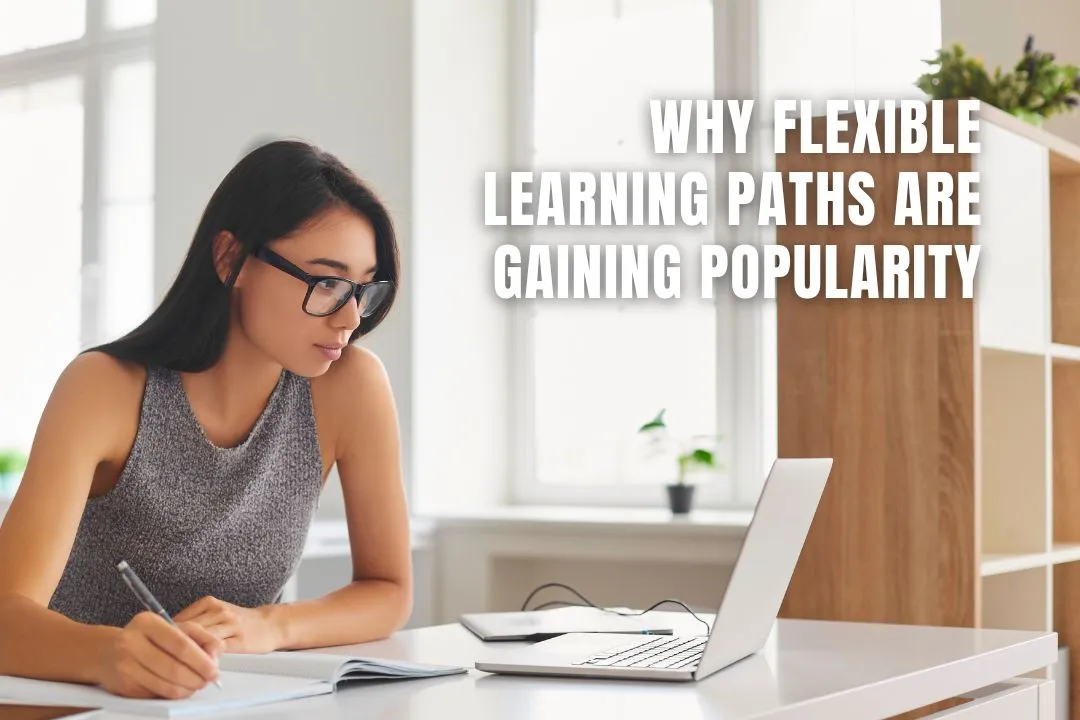
Editorial Disclaimer
This content is published for general information and editorial purposes only. It does not constitute financial, investment, or legal advice, nor should it be relied upon as such. Any mention of companies, platforms, or services does not imply endorsement or recommendation. We are not affiliated with, nor do we accept responsibility for, any third-party entities referenced. Financial markets and company circumstances can change rapidly. Readers should perform their own independent research and seek professional advice before making any financial or investment decisions.
Ever look at your schedule and think, “School’s just not possible right now”? You’re not alone. With work, family, and constant distractions, traditional classes no longer fit how most people live.
As jobs change and skills need regular updates, more learners are looking for education that fits into real life—not one that asks them to pause it. Flexible learning isn’t just convenient anymore—it’s essential.
In this blog, we will share why flexible learning paths are becoming the go-to choice for professionals today—and how they’re reshaping what education looks like in the real world.
Once upon a time, higher education came with a clear formula: full-time classes, set semesters, maybe a campus job if you needed cash. But in 2024, things are different. The average learner isn’t 19 and dorm-bound. They’re working, raising families, or making bold career shifts. They're fitting learning in between meetings or during lunch breaks.
And higher education is adapting. Colleges and universities, especially business schools, are realising that the people who want degrees the most are also the ones who can’t put life on hold to get them. They need structure that bends—not breaks. They need learning that moves with them, not against them. That’s exactly why accelerated MBA programmes online have gained so much traction. These programmes allow working professionals to earn a respected degree on their own time, without relocating or quitting their jobs.
But it’s not just about speed. It’s about relevance. Online MBAs now offer real-world projects, interactive platforms, and access to instructors who understand that life is already full.
The popularity of these programmes isn’t just a trend—it’s a reflection of a new kind of learner. One who’s ambitious, time-strapped, and fully aware that a flexible schedule is worth as much as a fancy lecture hall. These learners don’t want shortcuts. They want smart paths. And schools that provide those are seeing record enrolments.
One of the biggest shifts in education today is the move away from rigid, one-size-fits-all pathways. Not everyone learns the same way—or at the same pace. Some want to power through courses and finish quickly. Others prefer a slower burn, tackling one class at a time between work trips and school pickups.
Flexible learning allows for this kind of personalisation. It’s not about less effort—it’s about smarter design. Whether it’s through modular classes, rolling admissions, or asynchronous lectures, learners get to decide what works best. And that kind of control often leads to better results. When you can tailor your education to your lifestyle, you’re more likely to stick with it.
This shift is also part of a larger change in how people view their careers. Lifelong employment with one company is rare. Instead, people build careers like mosaics—switching industries, developing new specialties, and learning as they go. Flexibility in education makes this possible. It allows you to pivot without going backwards.
Flexibility isn’t just about time—it’s also about access. Traditional degrees often come with high costs, long commutes, and a one-size-fits-all model that doesn’t work for most people. Flexible learning breaks that mold.
Many online or hybrid programmes are more affordable. They cut out fees for housing, transportation, and campus services that remote learners don’t use. And because students don’t have to quit their jobs, they can continue earning while they study. That changes the game.
It also opens the door for people who were previously shut out of higher education—whether because of geography, family obligations, or cost. Flexible paths make learning more inclusive. And that’s not just good for students—it’s good for the workforce. More trained professionals mean stronger businesses, more innovation, and a healthier economy.
There was a time when online degrees raised eyebrows. Today, smart employers know better. They’ve seen firsthand that people who complete flexible programmes are often more driven, more organised, and more ready to lead.
Why? Because it takes discipline to juggle deadlines, work, and coursework. It takes motivation to upskill in your off-hours. And it shows a level of commitment that’s hard to ignore.
Many companies now actively support employees who want to pursue flexible degrees. Some even reimburse tuition. Because they know that investing in talent pays off—and that good employees with fresh skills are worth keeping.
As technology advances and industries evolve, flexible learning will keep growing. We’ll see more creative course formats, more specialised programmes, and even more collaboration between universities and employers.
But the biggest change? Mindset. Education is no longer something you do once and forget. It’s something you return to—again and again—as life changes, goals shift, and opportunities emerge.
Flexible paths give you the freedom to learn without putting your life on pause. They’re practical. They’re powerful. And for many, they’re the reason a dream that once felt out of reach now fits into the calendar.
Because in a world where change is constant, the best learning doesn’t get in the way. It moves with you.